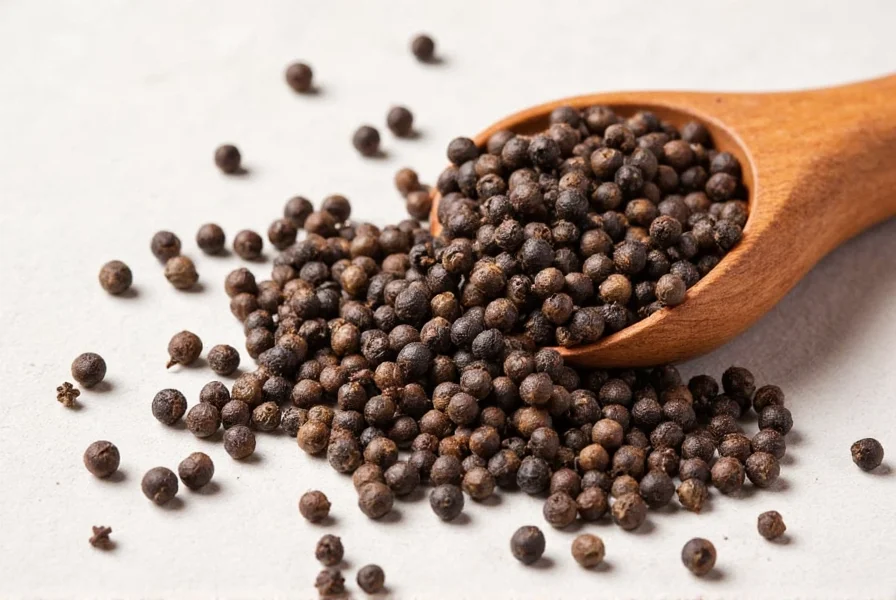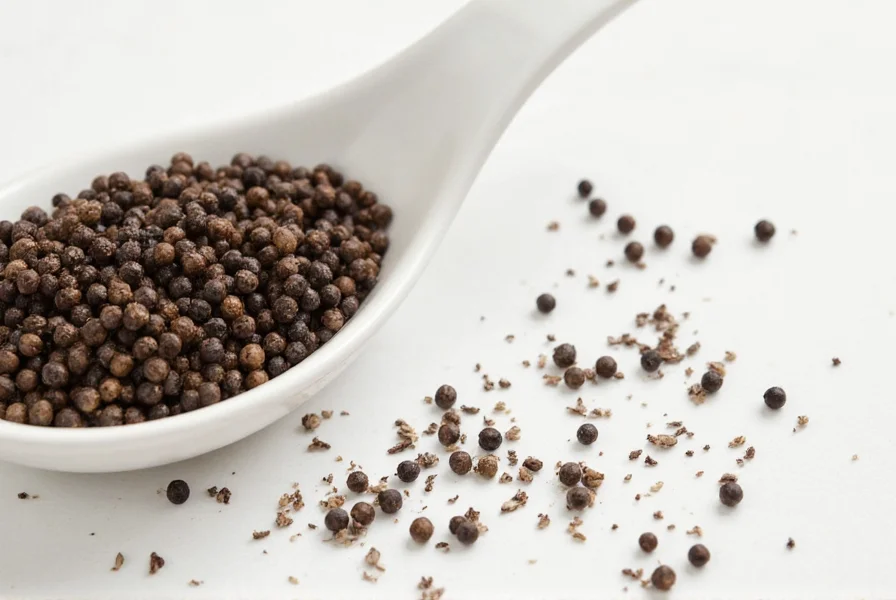Yes, black pepper does contain calories, but the amount is extremely minimal. One teaspoon (approximately 2.3 grams) of ground black pepper contains about 9 calories, primarily from its carbohydrate content. This negligible amount means black pepper won't impact your daily calorie intake even with regular culinary use.
When monitoring your diet, understanding the nutritional profile of even the smallest ingredients matters. Black pepper, one of the world's most popular spices, often raises questions among health-conscious individuals wondering does black pepper have calories that could affect their dietary goals. The straightforward answer is yes—but not in any meaningful quantity for calorie counting purposes.
Nutritional Breakdown of Black Pepper
To put black pepper's caloric content in perspective, let's examine its complete nutritional profile per standard serving:
| Nutrient | Per Teaspoon (2.3g) | Percent Daily Value* |
|---|---|---|
| Calories | 9 kcal | <1% |
| Total Fat | 0.2g | <1% |
| Carbohydrates | 2.1g | 1% |
| Dietary Fiber | 1.5g | 5% |
| Protein | 0.4g | <1% |
| Manganese | 0.2mg | 8% |
| Iron | 0.3mg | 2% |
*Percent Daily Values are based on a 2,000 calorie diet. Your daily values may be higher or lower depending on your calorie needs.
As you can see from the black pepper nutrition facts label, the caloric contribution is virtually insignificant. Even if you use a generous tablespoon (6.9g) of black pepper in your cooking—which would be far more than typical culinary applications—you'd consume only about 27 calories.
Why Black Pepper Contains Calories
All organic matter contains some caloric value because calories measure energy content. Black pepper derives its minimal calories from:
- Carbohydrates: Primarily dietary fiber and small amounts of natural sugars
- Fats: Trace amounts of essential oils
- Proteins: Minimal protein content from plant compounds
The active compound in black pepper, piperine, contributes to its flavor and potential health benefits but contains negligible calories itself. When considering how many calories in ground black pepper, remember that processing method (whole peppercorns vs. ground) doesn't significantly alter the nutritional profile.

Dietary Impact of Black Pepper Calories
For those tracking every calorie, understanding does black pepper affect calorie count is reasonable. The reality is:
- A typical seasoning amount (⅛ to ¼ teaspoon) contains 1-2 calories
- These calories won't register on any meaningful dietary tracking
- Black pepper's fiber content may actually support digestion and satiety
- The spice often enhances flavor without adding significant calories to dishes
Nutritionists generally consider spices like black pepper "free foods" on calorie-restricted diets. The calories in black pepper per teaspoon are so minimal that they don't require tracking in standard dietary planning. Even strict calorie counters focusing on black pepper macros nutrition find these values irrelevant to their calculations.
Black Pepper in Weight Management
Many people wonder is black pepper good for weight loss given its minimal caloric content. While black pepper itself won't cause weight loss, it offers several benefits for those managing their weight:
- Enhances flavor of low-calorie foods without adding meaningful calories
- May improve digestion and nutrient absorption
- Contains piperine, which some studies suggest may influence metabolism
- Helps reduce sodium intake by enhancing flavor without salt
Research published in the Journal of Agricultural and Food Chemistry indicates that piperine may affect how the body processes nutrients, though more studies are needed to confirm significant metabolic impacts. The primary value for weight management remains black pepper's ability to make healthy, low-calorie foods more enjoyable without compromising dietary goals.
Comparing Black Pepper to Other Spices
How does black pepper's caloric content compare to other common spices? Generally, all dried spices contain minimal calories:
- Garlic powder: 8 calories per teaspoon
- Onion powder: 7 calories per teaspoon
- Paprika: 6 calories per teaspoon
- Cumin: 8 calories per teaspoon
- Cinnamon: 6 calories per teaspoon
Among common spices, black pepper sits in the middle range for caloric density. However, the practical difference is meaningless in culinary applications since all these spices are used in such small quantities.

Practical Usage Recommendations
When incorporating black pepper into your diet:
- Use freshly ground pepper for maximum flavor and nutrient retention
- Store in an airtight container away from light and moisture
- Pair with healthy fats (like olive oil) to enhance absorption of fat-soluble compounds
- Don't restrict usage for calorie concerns—flavor enhancement supports adherence to healthy eating patterns
The minimal calories in black pepper shouldn't influence your usage. In fact, generous use may provide more health benefits from piperine and other compounds without meaningful caloric impact.
Frequently Asked Questions
How many calories are in a pinch of black pepper?
A pinch of black pepper (approximately 1/16 teaspoon or 0.3g) contains about 1 calorie. This negligible amount means you don't need to account for it in calorie counting.
Does black pepper kick you out of ketosis?
No, black pepper won't disrupt ketosis. With only 2.1g of carbohydrates per teaspoon (1.5g of which is fiber), the net carbs are minimal. Typical usage amounts contribute insignificantly to daily carb intake.
Is black pepper suitable for calorie-counting diets?
Absolutely. Nutrition professionals consider black pepper a "free food" on calorie-restricted diets. The 9 calories per teaspoon are too minimal to track, and its flavor-enhancing properties help make healthy eating more enjoyable.
Does the calorie content differ between black and white pepper?
The caloric difference is negligible. Both contain approximately 9 calories per teaspoon. White pepper has slightly less fiber (as the outer layer is removed), but this doesn't meaningfully affect the calorie count in normal usage amounts.
Can black pepper help with weight loss?
While black pepper itself doesn't cause weight loss, it supports healthy eating habits by enhancing flavor without adding significant calories. Some research suggests piperine may influence metabolism, but more studies are needed to confirm meaningful effects on weight management.











 浙公网安备
33010002000092号
浙公网安备
33010002000092号 浙B2-20120091-4
浙B2-20120091-4